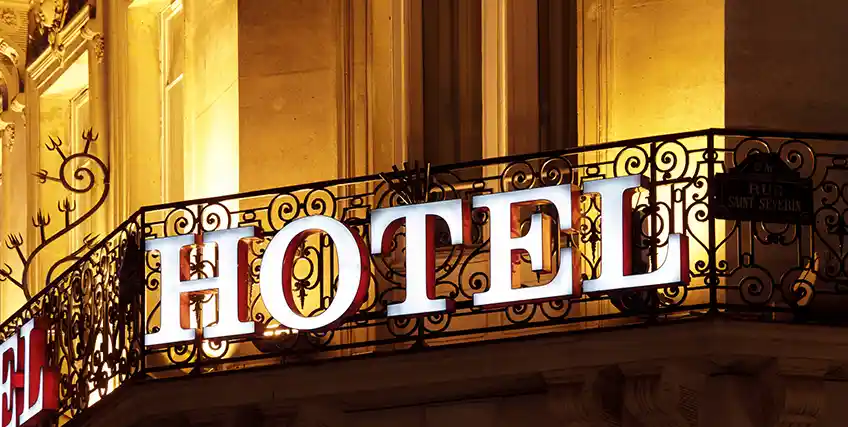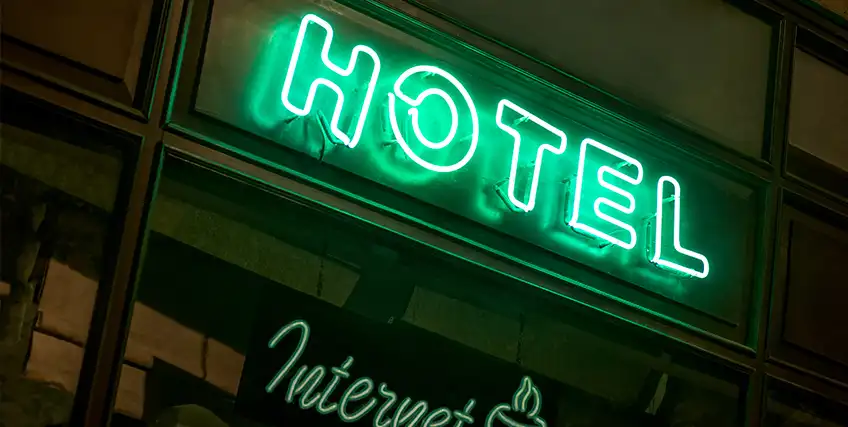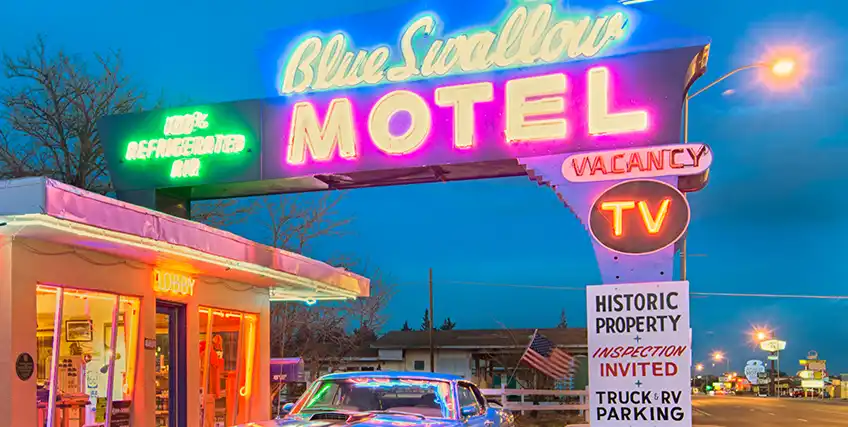Your Ultimate Guide to SBA Hotel Loans: How to Secure Funding for Your Hospitality Dream
February 06, 2025 | Last Updated on: February 07, 2025

Your Ultimate Guide to SBA Hotel Loans: How to Secure Funding for Your Hospitality Dream
Whether you’re dreaming of opening a hotel or expanding your existing hospitality operation, U.S. Small Business Administration (SBA) hotel financing can help. The cost to start a hotel ranges considerably based on location, the size of the hotel, amenities, and many other factors, but a 2018 study by consulting firm HVS indicates that the typical cost per room is about $323,500.
That’s a huge investment, and it’s just the beginning of the operating costs you can expect with a hotel. A government loan for a hotel business may be a huge help in getting started, whether you’re looking for an SBA hotel construction loan or SBA hotel financing to expand existing operations, this guide will cover what you need to know.
In this article:
- Types of SBA hotel financing available.
- How a government loan for a hotel business may be used.
- How to get SBA hotel financing.
What is SBA hotel financing?
An SBA loan is a type of small business loan that is backed by the U.S. Small Business Administration. The SBA doesn’t provide the funding, but rather works with approved SBA lenders to partially guarantee a portion of loan funds, thereby lowering the risk of default and incentivizing lenders to approve more borrowers.
Hoteliers looking to build from the ground up or expand will likely need upfront financing. An SBA hotel loan is simply financing backed by one of the SBA’s loan programs to fund your hotel project. It may be an SBA hotel construction loan for building from the ground up or, funding for acquiring real estate, refinancing existing debt, or getting an influx of working capital for your hotel business.
SBA financing for hotels may have stricter eligibility requirements, but being able to secure a partial guarantee from the SBA will likely increase your chances of being approved for the high loan amounts necessary to finance a hotel project.
Types of SBA Hotel Financing
While the SBA doesn’t have a specific loan program tailored to hotel financing, it does offer several financing options that would be suitable for current and aspiring hoteliers.
SBA 7(a) loans
The SBA 7(a) loan is the SBA’s most popular general-purpose loan program. These loans carry maximum loan amounts of $5 million and competitive interest rates of 2.75% + prime rate. They’re flexible loans that may be used for virtually any business need, from business and commercial real estate acquisitions to working capital, inventory, and more.
This flexibility makes 7(a) loans highly desirable since businesses in practically any industry can use them for a range of business purposes.
SBA working capital loans
Technically a part of the 7(a) program, we’re listing the SBA’s CAPLines and Working Capital Pilot program under its own heading since they offer different advantages. These programs offer both transaction-based and asset-based financing, allowing existing hoteliers to get the capital needed to invest in improvements or expansion.
SBA 504/CDC loans
One of the more complicated loan products, SBA 504 loans may nonetheless be an excellent government loan for a hotel business. This program combines loans from a non-profit Community Development Corporation (CDC) with a loan from a bank lender to create a single long-term, low-interest loan.
504 loans may only be used for selecting business purposes — usually to buy fixed assets like commercial real estate or heavy equipment. Still, since they carry maximum loan amounts of up to $5.5 million and competitive interest rates, 504 loans may be good options for SBA hotel financing if you’re looking to buy commercial property or industrial hospitality machinery like washing machines or commercial kitchen equipment.
How you can use SBA hotel financing
Depending on your situation and the loan program, you may use SBA financing for hotels for a variety of business purposes. Some of the most common include:
- Acquiring property: Buying an existing hotel can mitigate the high cost of buying land and building a new hotel from the ground up. Both 7(a) and 504 loan programs may be used for this purpose but bear in mind that the loan application and approval process may take more than a month, so it’s important to get started early.
- New construction: An SBA hotel construction loan is a good way to make a specific hotel vision come to life. However, in new construction arrangements, lenders will almost always invest more than just the value of the raw property, so you will likely need to meet high credit score requirements and provide significant collateral to secure the loan.
- Refinancing debt: Current hoteliers may be able to use SBA 7(a) loans to refinance existing hotel loans, freeing up cash flow for working capital needs or further hotel investment.
How SBA hotel financing works
Hotel financing isn’t available to everybody. Building a new hotel or expanding an existing one often has significant capital requirements and getting approved for reasonable loan terms will likely depend on several factors:
- Land value: The land and the hotel building typically represent the most of the business’s fixed assets. That property’s value will typically dictate the loan amount you may be eligible to receive. With an SBA hotel construction loan, you’ll likely have to provide significant collateral to cover the difference between the value of the land and the price of building a new property.
- Going concern value: This is the dollar amount assigned to the value or purchase price of the business over and above the base real estate value. It often applies to hotel acquisitions where the real estate value constitutes most of the business’s worth.
- Loan-to-value ratio: Also known as LTV, loan-to-value ratio represents the ratio between the amount of a loan and the total value of the asset to be purchased. The formula is: principal loan amount/property value = LTV. Like debt-to-income (DTI) ratio used in personal mortgages, lenders use this number to ensure they aren’t approving a loan amount that’s worth more than the property’s long-term value.
- Collateral: In commercial real estate, the value of the property itself is often used as collateral for a loan. However, if you’re building a new hotel, you’ll likely need to provide additional collateral, also known as a borrower injection, in the form of business or personal assets, to secure the loan.
How to get SBA hotel financing
Getting an SBA loan for a hotel business is a bit more complicated than simply applying for a small business loan. That said, the fundamentals are fairly similar.
Identify your needs
First and foremost, you must understand how much SBA hotel financing you need and why. Some important questions to ask include:
- Do I need capital to buy or build?
- What is the property value?
- How much cash can I afford to put down?
- How much can I afford in a monthly payment?
- Is a 7(a) or 504 loan better for my needs?
As you answer these questions, you’ll flesh out your business plan and get a better idea of how to use your SBA funding. When you have a clearer idea of your needs, use the SBA’s lender match tool to find a suitable partner.
Assess your creditworthiness
The basic SBA requirements are that you’re a registered business with fewer than 500 employees operating in the United States. After that, to qualify for SBA hotel financing, you should expect to meet some rigid lender standards to prove your creditworthiness. Some of the qualifications you’ll need to meet include:
- Property value: Whether you’re seeking an SBA hotel construction loan or financing to purchase an existing hotel, the lender will get the property appraised to ensure your loan request is in line with the true value of the property.
- Credit score: If you don’t have an existing business credit score, lenders will turn to your personal credit score. There’s no stated minimum credit score for SBA loan applicants, but you’ll have better luck with a higher score.
- Collateral: You may not need collateral for SBA hotel financing, but having access to it may give your loan application a nudge in the right direction.
- Down payment: Again, it may not be necessary, but a down payment (or business injection) may help your chances of getting approved.
- Business plan: Lenders want to know you have a clear plan for the money and the ability to execute. A strong business plan that clearly lays out a path toward profitability can increase your chances of being approved for SBA hotel financing.
Gather documentation
The SBA loan process requires significant documentation, both from the SBA itself and your lender. While the necessary documents may vary between lenders, you will most likely need:
- Driver's license
- Voided business check
- Bank statements
- Financial statements, like balance sheets and profit and loss statements
- Business, personal, and property tax returns
- Business plan
- Property listing, purchase agreement, or deed of trust
- Business debt information
You may need even more documentation depending on your situation. The SBA loan application is notoriously tedious, so establish a line of communication with your lender and make sure you understand absolutely everything needed before submitting your application.
Apply and wait
Finally, it’s time to apply! Once you’ve submitted your SBA hotel financing application, all you can really do is wait. The underwriting period may take a few weeks or even a couple of months.
Final thoughts
Ambitious entrepreneurs can do well in the hotel business. Whether you’re looking to realize a hospitality industry dream, or you want to expand an existing operation, SBA hotel financing can help. However, getting a government loan for a hotel business is a bit more complicated than a run-of-the-mill small business loan. There may be more documentation required, collateral to put up, and a lengthier process to get approved.
FAQs on SBA hotel financing?
How much does it cost to start a hotel?
There are many factors that go into a hotel’s startup costs. The consulting firm, HVS, estimates that the average cost per room is about $323,500. That can add up fast.
What is an SBA loan?
An SBA loan is one that’s backed by the U.S. Small Business Administration. These loans are offered through SBA-approved lenders and are partially guaranteed by the SBA, reducing the risk to both borrowers and lenders.
What are the benefits of SBA hotel financing?
While traditional bank loans are available to aspiring hoteliers, SBA loan programs typically offer more competitive interest rates and can mitigate some of the risk for borrowers.
How do you get a government loan for a hotel business?
Getting an SBA loan is always a bit of a process, and it can be even more daunting for something as high value as a hotel. You’ll need to identify exactly how much you’ll need and account for how you’ll spend the money in a thorough business plan before you approach a lender. Make sure you understand the value of the property you’re looking at and have collateral prepared if it’s necessary to secure a loan.
The SBA’s lender match tool is a good option to find the best lender for your needs. When you’re ready to apply, submit your application and wait.
Frequent searches leading to this page




